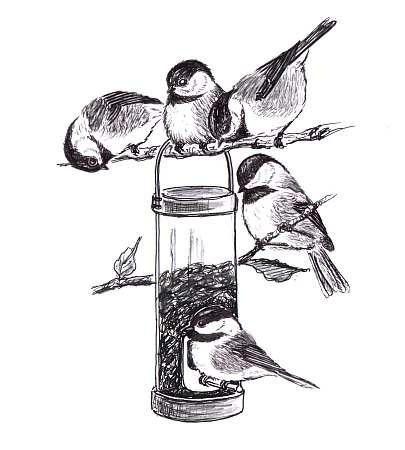
Dear Bird Folks,
I’ve noticed if one chickadee is eating from a feeder and another chickadee lands on the same feeder, the first chickadee almost always flies away, allowing the new chickadee to eat. Do chickadees have some kind of eating protocol or do they just have good manners?
Carl, Yarmouth
Whoa, Carl,
Eating protocol? Good manners? Who do you think you are writing to, Martha Stewart? I’m the last guy you should be writing to about manners. But you are right, chickadees do have a feeding behavior that is different than most feeder birds. Chickadees spend much of the year in “loose flocks” with other similar birds such as nuthatches and titmice. Birds that travel in loose flocks are still in a flock, but they don’t always need to be in the same tree or bush. They stay in contact with each other by using soft call notes. Birds in a traditional flock eat, sleep and travel all as one unit. The traditional flock includes some sandpipers, ducks, geese and gambling grandmothers on a bus tour to Foxwoods.
The chickadee flock is rather small, usually less than a dozen birds. The flock is formed around a dominant pair and consists of other pairs, a few young birds and a couple of single adults. Much like the cast of a television sitcom. The flock then stakes out a territory and defends it against other flocks. If a feeder is on the edge of a territory, then more than one flock can use the feeder, with only minor conflicts.
Because the flock has a feeding hierarchy, the dominant birds get to eat first or when they want to. It is not politeness or manners that cause a chickadee to give up its spot at a feeder. When a dominant chickadee flies in, the other chickadees give way so they won’t end up getting a whuppin’ in front of their pals.
But that only explains part of the chickadees’ behavior. Chickadees often only grab one seed at a time and fly off. Isn’t that a total waste of energy for the chickadees to fly back and forth with one seed at a time? On a cold winter’s day that used energy could be critical. Wouldn’t they be better off eating nonstop like finches, instead of flying back and forth?
I realize you haven’t asked these questions Carl, but I know you are suddenly thinking them. So instead of having to deal with your rebuttal next week, let’s get it over with right now. Yes, eating like pigs all at once does have its advantages. It saves energy. Finches know it, that’s why they do it. However, hawks know it, too, and they love to pick off tasty finches as they stuff their beaks nonstop on a bird feeder. And while Mr. Fat Finch is getting a free ride around the neighborhood via Mr. Hawk’s talons, our friend the chickadee is safe in the bushes, eating its seed, and wondering why things suddenly got so quiet.
For many birds, the flock feeding behavior has worked very well, but the chickadees have done equally as well using this weird feeding hierarchy. Which behavior is the best isn’t important as long as they both work. However, I’ll bet I know which method Mr. Hawk likes the best.